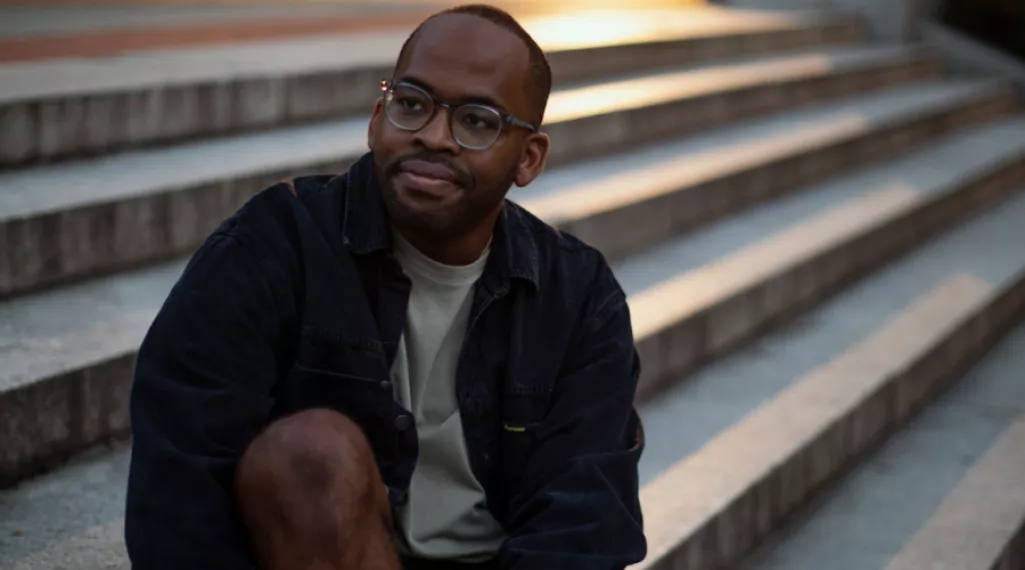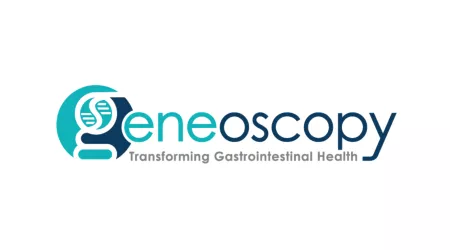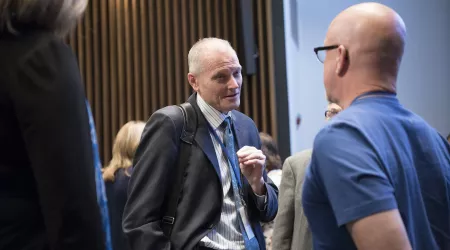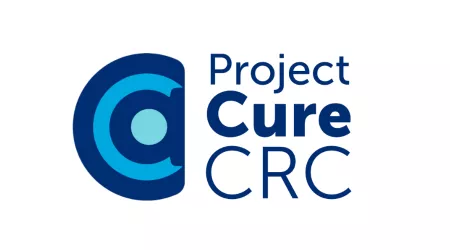
Evan Daniels: Remembering his father on World Cancer Research Day

Evan Daniels is no stranger to the presence of cancer in his life. His father, Robert Daniels, was diagnosed with stage II colon cancer when Evan was just eight years old. Fortunately, Robert’s disease was caught early, and he was able to watch Evan grow.
Roughly twenty-five years later, Robert would meet cancer for the second time. Diagnosed with pancreatic cancer in 2018, Robert died two short years later. While it’s been more than three years since his death, Robert’s memory lives on through Evan and those he loved.
This World Cancer Research Day, Evan reflects on the memory of his father, the importance of cancer research, and what he hopes others will be aware of when it comes to colorectal cancer (CRC).
Remembering Robert Daniels
When Robert was first diagnosed with colon cancer at age 41 in 1993, the Alliance hadn’t yet been formed. Evan reflects on how difficult it was for him to grasp the situation as an eight-year-old boy without resources to help him understand.
“I think my parents didn’t want to burden me with information, so they chose to withhold a lot of details,” Evan said. “The gravity of it didn’t sink in until years later.”
Fortunately, Evan’s mother worked in the medical field and was able to successfully help navigate a CRC diagnosis. Later, Evan’s mother would help him understand what cancer really meant.
“When my dad was going through treatment, I knew he was ill but I didn’t know the specifics,” Evan said. “At 13, I remember going to get a physical for school sports with my dad. The doctor asked if we had a family history of cancer. When he answered yes, I was surprised and felt like I was hearing about it for the first time. Then I started asking my mother a lot of questions about it.”
Evan feels grateful that his mother was able to help his father through the difficulty of cancer, not only once, but twice. While Robert died in 2020 of pancreatic cancer, he is remembered fondly by loved ones, co-workers, neighbors, and congregation members.
“It was a gift to have him in our lives for as many years as we did,” Evan said. “He was a great dad, super attentive and present throughout most of my life. He was always at major events, and was super encouraging. He had an infectious positive attitude, and would give me advice when I asked for it.”
Evan on Knowing Your Family History and the Importance of Screening
Although Evan’s mom tried to encourage his father to get genetic testing after his colon cancer diagnosis, he did not receive testing until years later when diagnosed with pancreatic cancer. Because of Evan’s family history, he knows the significance of taking advantage of testing that could change the outcome of disease or treatment.
“Knowing if you have a genetic marker for a disease can be an important factor when a cancer specialist is choosing which chemotherapy regimen or drugs could be effective in fighting your cancer,” Evan said.
Evan, now 36, started getting screened at age twenty-eight after his mom encouraged him and his sister to get tested for the Lynch syndrome marker.
“I was experiencing some gastrointestinal symptoms, so my doctor decided to order me a colonoscopy given my family history,” Evan said. “They found multiple polyps, including some that were precancerous. Now I get screenings every year.”
Early cancer detection is key across most cancers for positive prognosis, with colorectal cancer having a 91% survival rate when caught in its earlier, localized stages.
“I want to encourage people who have a family history to get screened and get their genetic testing done,” Evan said. “Because I was aware of my father’s history with cancer and Lynch syndrome, I found out I carried the same genetic marker as him.”
As someone who’s been dealing with cancer since he was a young boy, Evan understands how frightening it can be to search for answers. Still, he’s found that knowing is better than not knowing. There are ways to push back against disadvantages he may face.
“Even though my father had colon and pancreatic cancers, it was still shocking to me to learn I had Lynch sydrome,” Evan said. “It really made me consider my own mortality. When I learned about biomarkers and how important preventative screenings are, I became more empowered with my situation. There are so many great testing and treatment options available today. Because of advancements in science, it doesn’t have to be this scary thing anymore.”
Evan knows the importance of speaking up about symptoms, getting on-time screening, and knowing one’s family history. He also knows that more research is needed across all cancer fields to ensure people don’t suffer similar fates as his father.
Evan’s Involvement in Cancer Funding Throughout the Years
Throughout Evan’s life, he has been involved in various cancer fundraising events and initiatives. To him, it touches close to home.
“I felt like I was given a gift when my dad survived colon cancer when I was a child,” Evan said. “I got to spend so many more years with him. So it became a mission of mine to get involved in cancer research and funding.”
Evan participated in many school campaigns and cancer functions throughout the years.
“I would raise money doing Relay for Life by asking my family and friends to participate,” Evan said. “We also started doing the Detroit Walk to End Colon Cancer, and it became a regular part of my life.”
When Evan was 31 years old, he remembered receiving the news that his father had cancer for the second time.
“I was more distraught this time,” Evan said. “I was at a friend’s house for dinner when my parents called and told me the news. I knew by the tones in their voices that something was wrong. Afterward, I broke down in front of my friends. I just couldn’t believe we were going through this again. Still, I thought we would overcome it like we did the last time.”
When Evan’s father died, it renewed his passion for raising money and awareness for cancer research and funding.
Why World Cancer Research Day Matters & How to Get Involved
World Cancer Research Day (WCRD) – established in 2016 and celebrated on September 24 each year – is a day that means a whole lot to Evan and his family.
“WCRD is important because cancer has been touching the lives of countless families for decades,” Evan said. “It’s taken too many of the people we love. We need to understand the warning signs and early symptoms of various cancers, so we can get necessary treatment as soon as possible. The more we know, the more treatment options will be available.”
Evan shares his optimism about cancer funding and research.
“There’s so much momentum around trying to solve these issues,” Evan said. “The more we push the science forward, the higher success rates we will see. It’s about showing up in solidarity for an issue that affects so many. Let’s inspire people to become scientists, researchers, and analysts. Let’s celebrate volunteers and donors and funders.”
Evan believes in the Alliance’s mission and a world without colorectal cancer. That’s why he is urging people to get involved in whatever way they can.
“Every year we have an opportunity,” Evan said. “World Cancer Research Day is a reminder to volunteer, to raise money, and to help support cancer research moving forward. Together, we can realize a world without cancer.”
Speaking Up About CRC & Its Impact on the Black Community
Colorectal cancer, the second-deadliest cancer and fourth most common, is perhaps one of the most treatable cancers when detected early. Evan reflects on the importance of breaking down stigmas to save lives.
“It’s important not to be ashamed when it comes to colorectal cancer or any other cancers,” Evan said. “CRC is trending a little younger than it was previously, so it’s good to stay on top of screenings and remain vigilant.”
Evan shares what it’s like to deal with CRC stigmas as a Black man.
“There’s a lot of stigma in the Black community about medical issues, including denial and a lack of proactiveness,” Evan said. “I want to be the change that allows people that look like to me to know this is important. Get screened, follow the research, and know what resources are available to you. You’ll have more favorable outcomes the earlier you detect CRC.”
In addition to working on overcoming this disease in our lifetime, the Alliance is also funding research that is investigating race-informed disparities and taking action to reduce health inequities in real-time.
“The Alliance is a great resource that I wish would have been around while my father was battling colon cancer. If I can help the Alliance in any way by raising money, awareness, or participating in research, I will. I want to do that because we need our parents and loved ones around. I’m grateful my dad was able to see me grow up because of early detection, and I want to make sure other people have those opportunities, as well.”
A producer and production manager in NYC, Evan has a passion for bringing stories about the Black American experience and other BIPOC communities to the forefront.
“We need to give a platform to the underrepresented communities, and this is super relevant when it comes to colorectal cancer,” Evan said. “Stories like Trey Mancini’s or James Casey’s are eye-opening to the realities we’re facing. With 35% more African Americans dying from this disease, world cancer research is even more important for the Black community.”
Evan has come a long way from the eight-year-old boy who once faced his father’s colorectal cancer diagnosis he didn’t quite understand. The Alliance hopes that stories like Evan’s will help bring awareness to the life changing research that is needed today.
“Find some way to get involved,” Evan said. “The Alliance and other cancer organizations have so many different volunteer and donation opportunities. If we work together today, we can prevent tragedies tomorrow. I’d give anything to see my dad again. I’ll keep living in his honor as I work to fight cancers of all kinds.”
Top resources

FDA approves ColoSense, mt-sRNA screening test from Geneoscopy
ColoSense is a screening test for adults, 45 years of age or older, who are at average risk for developing colorectal cancer (CRC).

Dr. John Marshall joins the Alliance as Chief Medical Consultant
A veteran in the field of gastrointestinal cancer research, Dr. Marshall will share his leadership experience and scientific expertise to guide the Alliance’s patient support and research initiatives, particularly Project Cure CRC.

Alliance Announces Request for Proposals as it Launches the Largest-Ever CRC Research Investment
In an effort to expedite its life-saving work, the Colorectal Cancer Alliance (Alliance) Project Cure CRC initiative is excited to open its Request for Proposals (RFP). Tens of millions of dollars will be available to researchers from around the world whose work aims to expedite colorectal cancer (CRC) research to a curable science.





